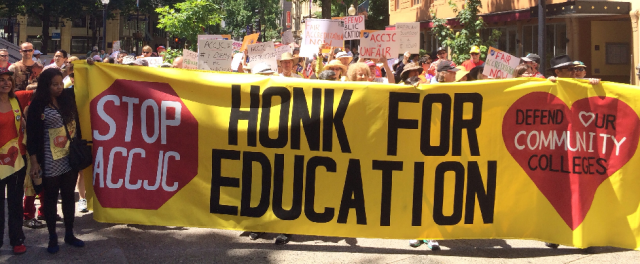City College of San Francisco is one of the town’s most beloved institutions. It survived the July 2012 attack by the Accrediting Commission of Community and Junior Colleges. Two lawsuits–one by the California Federation of Teachers; the other, by San Francisco’s city attorney—chastened the ACCJC, but the negative publicity damaged enrollment, every school’s source of state revenue.
Though the college’s stellar academics were never disputed, and the school wasn’t bankrupt, it had been hurt by the Great Recession. Then-Chancellor Don Q. Griffin correctly predicted that two November 2012 ballot measures would rebuild the reserves. San Franciscans did pass a parcel tax, and Californians passed a wealth tax. But it was too late. After Griffin retired for health reasons, the replacement interim chancellor said, in effect: “You will have a City College, but you won’t recognize it.”

For a dozen years, a series of chancellors have subscribed to the “completion agenda,” where certificates, degrees, and transfers to four-year universities are prized over a comprehensive community college that also values cultural enrichment, civic engagement, and life-long learning. Their vision: a junior college focused on 18-24-year-old full-time students dependent on bank loans.
Administrations misdirected the new taxes and then mismanaged state “stabilization” funds intended to help the college through the accreditation crisis. Too much money interfered with their goal of shrinking the college. Then, as money dwindled, administration cut classes.
Instead of pruning, they slashed and burned: revenue producing classes gone; student education plans destroyed; older adults banished from lifesaving instruction. The remaining English as a Second Language classes ballooned to sizes not conducive to learning. A downward enrollment spiral intensified. Fewer classes, fewer students, less state funding, more downsizing.
Enrollment suppression, fostered by a lack of rigorous outreach and a faulty registration system, also fueled a shrinking college. The marketing director, who created a multi-pronged approach to student recruitment, received inadequate support; she left and hasn’t been replaced.
In May 2022, the current chancellor laid off 38 tenured and tenure track faculty and hundreds of part-timers. Union-led chants, directed at the Board who approved the lay-offs, filled the area outside the administration building, where faculty and others camped out, with some getting arrested in civil protest. Your “yes” vote now is our “no” vote in November!
That November, San Francisco voters, many of whom have taken City College classes and love the college, elected a labor-backed Board of Trustees who, along with one of the remaining incumbents, have been working to restore what was lost.
But when the new board asked the current chancellor to return laid off full-time faculty–24 of whom remain on the call back list, after department consolidations and retirements brought back about a dozen of them—he refused to act. When 300 students filled English 1A waitlists last fall, he only recalled a few of the six laid-off English faculty and then only as long-term subs. While hundreds of students languished on waitlists this spring, nothing. He insists the money isn’t there, but AFT 2121 budget analysts disagree.
In May 2022, when the chancellor laid off full-time faculty, claiming a deficit, the union accurately predicted a $9.3 million surplus. Current union analysis goes further: “In 2023-24, City College is projected to have a $5 million surplus, and reserves of $24.1 million or 12% of total spending. Over the next five years, we project City College to run a series of surpluses, and to end 2028 with net reserves of $52.6 million or 25.95% of total spending.”
Slash and burn agriculture is not sustainable. It destroys ecosystems and biodiversity. A healthy ecosystem contains multiple forms of life interacting with each other in community. A restored ecosystem at City College would grow enrollment, including among students of all ages and diverse academic goals:
•Immigrants seeking English language skills for jobs and civic engagement.
•Seniors looking for ways to promote health and well-being.
•Community activists and others focusing on ethnic studies and social justice.
•People pursuing music, theater, film, art, and dance careers, or cultural enrichment.
•People needing to learn a foreign language for their job, or for travel.
•People wanting a self-defense, yoga, or swim class for physical and mental health.
•People building skills for careers, such as nursing and aircraft maintenance technology.
•And, yes, people seeking associate degrees and transfer to four-year universities.
A strong ecosystem would foster a sustainable budget with revenue from classes students need and want. It would return laid off full-time faculty and enough part-timers to meet student demand.
But challenges remain.
The current chancellor leaves June 30; the board must choose a leader who shares the people of San Francisco’s vision for their college.
This past January, ACCJC put City College on warning, nowhere nearly as bad as the 2012 unfair sanction, but the board must meet three flagged standards while demonstrating the financial sustainability of a comprehensive community college.
With a chancellor in alignment with student demand and the goal of regrowing the college, the City College ecosystem will thrive. It’s about time.
Leslie Simon, retired faculty, is the former chair of the Women’s and Gender Studies Department at City College of San Francisco.





